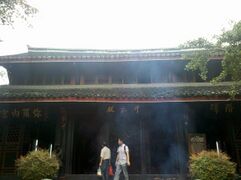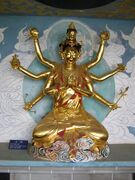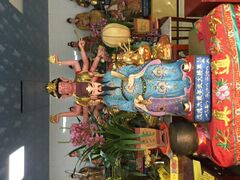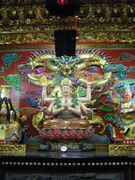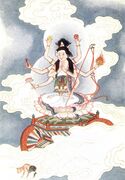Doumu
Topic: Religion
 From HandWiki - Reading time: 3 min
From HandWiki - Reading time: 3 min
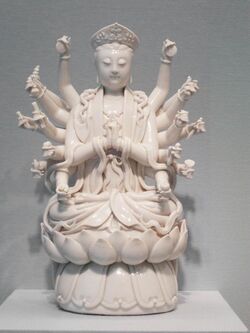
Dǒumǔ (Chinese: 斗母; literally: 'Mother of the Great Chariot / Big Dipper'), also known as Dǒumǔ Yuánjūn (斗母元君 "Lady Mother of the Chariot"), Dòulǎo Yuánjūn (斗姥元君 "Lady Ancestress of the Chariot") and Tàiyī Yuánjūn (太一元君 "Lady of the Great One"),[1] is a goddess in Chinese religion and Taoism. She is also named through the honorific Tiānhòu (天后 "Queen of Heaven"), shared with other Chinese goddesses, especially Mazu, who are perhaps conceived as her aspects. Other names of her are Dàomǔ (道母 "Mother of the Way") and Tiānmǔ (天母 "Mother of Heaven").[2]
She is the feminine aspect of the cosmic God of Heaven.[1] The seven stars of the Big Dipper, in addition to two not visible to the naked eye, are conceived as her sons, the Jiǔhuángshén (九皇神 "Nine God-Kings"), themselves regarded as the ninefold manifestation of Jiǔhuángdàdì (九皇大帝, "Great Deity of the Nine Kings") or Dòufù (斗父 "Father of the Great Chariot"), another name of the God of Heaven. She is therefore both wife and mother of the God of Heaven.[3][4] In certain Taoist accounts she is identified as the ambiguous goddess of life and death Xiwangmu.
In religious doctrines
Taoist esotericism
In the esoteric teachings of Taoism she is identified as the same as Jinling Shengmu, Jiutian Xuannü (九天玄女 "Mysterious Lady of the Nine Heavens") and Xiwangmu (西王母 "Queen Mother of the West"), representing the mother of the immortal "red infant" (赤子 chìzǐ) Dao enshrined at the centre of the human body.[5] This links her directly to the myths about the birth and initiation of Laozi[5] and the Yellow Emperor (whose mother Fubao became pregnant of him after she was aroused after she saw a lightning from, or turning around, the Big Dipper[6]), as attested, among others, by Ge Hong (283-343).[7]
Buddhist interpretation
In Vajrayana traditions of Chinese Buddhism (Tangmi), Doumu was conflated with Bodhisattva Marici at least by the Tang dynasty. Marici too is described as the mother of the Way and the Dipper, at the centre of Brahma's Heaven of primal energy. Marici's chariot is pulled by seven boars.[1] The incantation used in the Taoist scripture dedicated to Doumu is the same as one of the longer Buddhist dharanis used for Marici, but with eight verses in Han Chinese added in the beginning to praise her.
Artistic depictions
- Doumu in art
-
Hall of Doumu at the Green Ram Temple in Chengdu, Sichuan, China
-
Doumu altar at a temple in Butterworth, Penang, Malaysia
-
Statue of Doumu at the Green Ram Temple
-
Song dynasty statue of Doumu
-
Statue of Doumu in Kunming, China
-
Doumu behind another god at Huayang Taoist Temple in Jieyang, Guangdong, China
-
Statue of Doumu in Taiwan
-
Illustration of Doumu (1922)
See also
- Tai Sui
- Nine Emperor Gods Festival
- Chinese theology
- Big Dipper
- Other goddesses identified with the Great Chariot
- Ungnyeo
- Ninlil
- Ninhursag
References
Citations
- ↑ 1.0 1.1 1.2 Wells (2013), p. 10.
- ↑ Fowler (2005), p. 213.
- ↑ Cheu, Hock Tong (1988). The Nine Emperor Gods: A Study of Chinese Spirit-medium Cults. Time Books International. ISBN 9971653850. p. 19.
- ↑ DeBernardi, Jean (2007). "Commodifying Blessings: Celebrating the Double-Yang Festival in Penang, Malaysia and Wudang Mountain, China". in Kitiarsa, Pattana. Religious Commodifications in Asia: Marketing Gods. Routledge. ISBN 978-1134074457.
- ↑ 5.0 5.1 Pregadio (2013), p. 1207.
- ↑ Bonnefoy, Yves (1993). Asian Mythologies. University of Chicago Press. ISBN 0226064565. pp. 241, 246.
- ↑ 抱朴子曰:復有太清神丹,其法出於元君。元君者,老子之師也。太清觀天經有九篇,云其上三篇不可教授,其中三篇世無足傳,常瀋之三泉之下,下三篇者,正是丹經上中下,凡三卷也。元君者,大神仙之人也,能調和陰陽,役使鬼神風雨,驂駕九龍十二白虎,天下衆仙皆隸焉,猶自言亦本學道服丹之所致也,非自然也。ctext.org. See translation in "Humans, Spirits, and Sages in Chinese Late Antiquity: Ge Hong's Master Who Embraces Simplicity (Baopuzi)", in Extrême-Orient, Extrême-Occident, 2007, N°29, pp. 95-119. Academia.edu.
Sources
- Didier, John C. (2009). "In and Outside the Square: The Sky and the Power of Belief in Ancient China and the World, c. 4500 BC – AD 200". Sino-Platonic Papers (Victor H. Mair) (192). Volume I: The Ancient Eurasian World and the Celestial Pivot, Volume II: Representations and Identities of High Powers in Neolithic and Bronze China, Volume III: Terrestrial and Celestial Transformations in Zhou and Early-Imperial China.
- Fowler, Jeanine D. (2005). An Introduction to the Philosophy and Religion of Taoism: Pathways to Immortality. Sussex Academic Press. ISBN 1845190866. https://books.google.com/books?id=9wi-ZDdmaqEC.
- Pregadio, Fabrizio (2013). The Encyclopedia of Taoism. Routledge. ISBN 978-1135796341. https://books.google.com/books?id=R3Sp6TfzhpIC. Two volumes: 1) A-L; 2) L-Z.
- Wells, Marnix (2013). The Pheasant Cap Master and the End of History: Linking Religion to Philosophy in Early China. Lulu.com. ISBN 978-1931483261. https://books.google.com/books?id=KWasBQAAQBAJ.
 |
 KSF
KSF